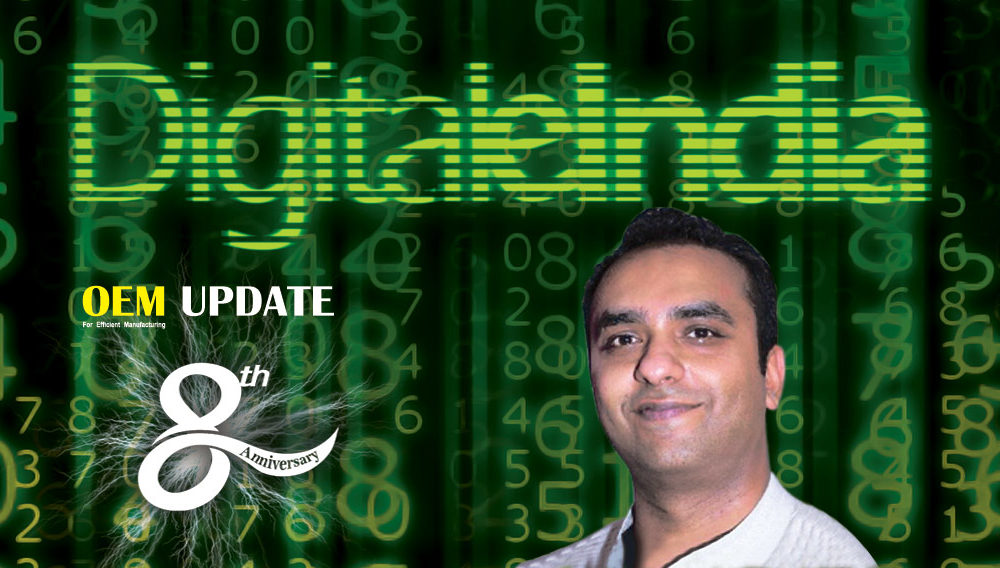Greater efficiency in manufacturing thanks to digitisation
June 29, 2017 4:26 pm
With IIoT, smart manufacturing and Industry 4.0, more sensors, data and real-time information about fundamental production will provide additional leverage to existing manufacturing systems.
Schneider Electric is the global specialist in energy management and automation. “A simple way of making your workplace more appealing is by embracing digitisation and ensuring you are getting the most from it,” believes Piyush Rajpal, GM – Marketing & EU Sales, Industry Business, Schneider Electric. Here’s what he has to say about India’s manufacturing prowess with digitisation.
A powerful innovation process
The digitisation of manufacturing is a powerful innovation process that is rapidly making its way. ‘Digitisation of manufacturing’ refers to the salient and evolving role of digital tools and artefacts in the design, sourcing, manufacturing, configuration, delivery, and eventually, repair, refurbishment, or renewing of products.
Not only can the digitisation of manufacturing provide manufacturers with better internal processes and enable greater efficiency and thereby improved profitability, but it can also enable them to attract more employees. Companies should decide which devices and providers they will allow and support.
A simple way of making your workplace more appealing is by embracing digitisation and ensuring you are getting the most from it. The creation of a more modern workplace where employees can work with current technology both in the office and at home, ensures that they don’t become frustrated in the workplace.
Smart manufacturing gaining acceptance
Smart manufacturing initiatives which include digitisation are accelerating the creation of new technologies and are transforming the global manufacturing scenario. Progressive Indian industrial companies too are investing heavily in digital technologies such as sensors, connected devices, software and applications such as manufacturing excellence systems. The manufacturing sector in India has realised that smart manufacturing will have the power to link the entire value chain from raw material to end user leading to continuously optimised manufacturing processes, driven by artificial intelligence, and will ultimately result in energy and cost efficiency.
Industries in India are already shifting to embrace and experiment with new technology and processes. With IIoT, smart manufacturing and Industry 4.0, more sensors, data and real-time information about fundamental production will provide additional leverage to existing manufacturing systems.
Helps addressing consumer market trends
Smart machines represent a tremendous advancement for any industry that relies on machine technology. The term “smart machine” refers to machines that are better connected, more flexible, more efficient and safer. They can respond quickly to new demands and maximise efficiency through intuitive collaboration with their users. A smart machine is also capable of participating in predictive maintenance practices while minimising its own environmental footprint and total cost of ownership.
Schneider Electric applies the latest technologies to machines which helps address consumer market trends such as the expectation of universal connectivity, the ever increasing reliance on mobile devices, and the demand for machinery that is easy to install and use.
The technologies that make all this possible include Ethernet connectivity which enables the integration of networks and improved access to data, mobile technologies for safer, more remote operation of equipment and digitisation for low cost development of machine automation simulation programs.
Four main characteristics of smart machines:
Efficiency: Sensors and embedded knowledge enable smart machines to monitor their own components and environment. By providing the most relevant information to operators, manufacturing lines can produce in a more reliable, flexible and efficient manner. In addition, their ability to assess data quickly and in a decentralised fashion means that decision making can be accelerated, reducing backlogs etc.
Safety & security: These two concerns are priorities for companies today and smart machines are designed with them in mind. They improve the safety of operators and minimise the security risk associated with increased networking.
Flexibility: Plug-and-work, modularity, and reusable designs are all intrinsic elements to smart machines, making them much more user friendly than their predecessors.
Connectivity: Direct connection to the broader network via Ethernet means smart machines offer data sharing and production planning capabilities that go far beyond those of traditional standalone machinery and automation. By bridging the information technology (IT) and operations technology (OT) gap, they make vital production data available to those who need it most. The digital mobility that they offer also allows operators and engineers newfound flexibility to access data anywhere to diagnose problems etc, speeding up their resolution and reducing downtime.
Driving customer engagement
We live in a digital-first world where digitisation and its effects are now reaching into every corner of our lives. Technology is reshaping our lives and how we do business. We must remember that digitisation is not about how many devices one possesses, and what technology one works with, it is about how these technologies and devices put together are improving the efficiencies of manufacturing processes and resulting in providing a differentiated “digital” customer experience to the customers.
In a world of instant gratification, organisations need to be able to answer and provide support 24×7. Digitisation in manufacturing process provides continuous attention and help transform how we interact and engage with customers. Organisations should be in tune with this trend of digitisation to simplify the businesses and improve their customer experience to sustain in this competitive world.
Cookie Consent
We use cookies to personalize your experience. By continuing to visit this website you agree to our Terms & Conditions, Privacy Policy and Cookie Policy.



















 English
English Hindi
Hindi